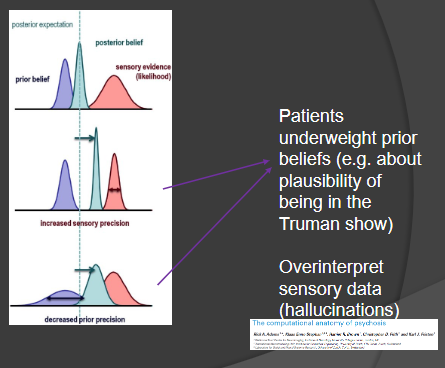Delusions
1/9
There's no tags or description
Looks like no tags are added yet.
Name | Mastery | Learn | Test | Matching | Spaced | Call with Kai |
|---|
No analytics yet
Send a link to your students to track their progress
10 Terms
Delusion
"A false belief based on incorrect inference about external reality that is firmly sustained despite what almost everyone else believes and despite what constitutes incontrovertible and obvious proof/evidence to the contrary" (DSM-IV, 2000)
OR
SM V: Fixed beliefs that are not amenable to change in light of conflicting evidence. Their content may include a variety of themes (e.g. persecutory, referential, somatic, religious, grandiose).[...] These are deemed bizarre if they are clearly implausible and not understandable to same-culture peers and do not derive from ordinary life experiences. [...] The distinction between this and a strongly held idea is sometimes difficult to make and depends in part on the degree of conviction with which the belief is held despite clear or reasonable contradictory evidence regarding its veracity
Problems
With DSM IV definition (Coltheart, 2007):
Couldn’t belief in something true be delusional if
you held the belief for the wrong reasons?
Does a delusion have to be a belief – can’t it be
something you imagine or perceive?Does the belief have to concern external reality-
what about internal states?Can’t a belief which is shared by everyone you
know still be delusional?
Clinical delusions
A diagnosis of this occurs when a person has one or more non-bizarre (situations that can take place in real life, although not real but are possible) delusional thought for one month or more, that has no explanations other than a psychological basis
Capgras delusion
The delusion that familiar people have been
replaced by impostors.
May extend to familiar objects.
Tends to be specific to visual encounters rather
than other modalities.
Mirror-sign delusion
Inability to recognise oneself in the mirror.
May be associated
with dementia.
Fregoli delusion
Unfamiliar people are actually people you
know who have disguised themselves. They
have bad intentions towards you.‘People I know are following me around, but
in disguise, so I can never recognize them’
(from Coltheart, 2007)
Constituents
(/Explanation Of a delusion)
Some sort of deficit which changes the way our minds or bodies work
A refusal to reject beliefs arising from the deficit
Frequent encapsulation of the delusion - beliefs are not acted on; missing people are not searched for, people claim to be dead but still walk around and talk... Casts doubt on the notion of a consistent 'web of belief'
Delusions may come and go
Bayesian inference
Goal: optimise beliefs about parameter of interest.
→ What is the chance of rolling a six (Θ)?
In a graph (showing (bell) curve distributions) we can quantify our beliefs about Θ
(tbh I don’t know much about this. image is meant to help but idk if it does)

Neurobiology
(Relations to)
NMDA receptors play a key role
in controlling synaptic gainNMDA-R dysfunction has been
proposed as a primary pathology
in schizophrenia (e.g. effect of
ketamine)Hypothesis: NMDA-R
abnormalities lead to aberrant
signalling of precision, and
therefore pathological inference
Explanation
(General)
Propose one general deficit
But how does this relate to specific
delusions? (And those not found in
psychosis?)Also Functional disorders…